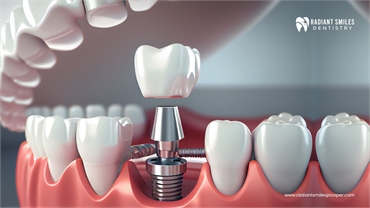Types of Dental Implant

Why is it so scary to lose a tooth
You’re not alone in this phase. Tooth loss is absolutely normal at a certain age. But that doesn’t mean that we will compromise our appealing smile appearance, right? We know the value of your beautiful smile. That is why we are here to portray different perfectly suitable options to regain your mesmerizing smile. In this comprehensive blog, we are going to discuss the 3 most effective types of dental implants. Just go through each and decide the most suitable dental implant type for yourself.
What is a Dental Implant?
A dental implant is one of the most effective modern solutions for replacing your missing teeth. This is a kind of surgical amalgamation specially prepared from titanium which is supposed to be placed into the patient's jawbone in order to fill that gap of missing tooth. Over time, technology has evolved and it is considered that dental implants have the capacity to provide a robust foundation and easily get adjusted with the jawbone. Dental implant helps you regain dental comfort, and stability and bring back the natural functionality of your teeth, unlike traditional denture.
What are the types of Dental Implant?
The types of dental implants have been divided into 3 major categories. These are as follows.
Endosteal Implants
This is the simplest and common dental implant type which can be suitable for the majority of the patients. Provided if the patients have great oral health and strong jawbone.
Endosteal dental implants entail the surgical adjustment of screw-shaped posts directly into the jawbone. Implants need some time to adjust and create a great bond with the underlying jawbone after posts are in the determined place.
This dental implant can be used to replace single lost teeth or to support dental bridges or dentures when many teeth are missing. This dynamic nature of endosteal implants makes it one of the prominent and well-prefered options among all three types of dental implants.
Now let’s see the pros and cons of Endosteal Implants to help you make a more informed decision:
Pros of Endosteal Dental Implants:
1. Exceptional success ratio
2. Covers diverse dental implant concerns
3. Provides extensive dental restoration
4. Lasting solution
5. Gives authentic look
Cons of Endosteal implants:
1. Can not be effective if there is a rigid jawbone
2. Have an excessive treatment and healing time
2. Subperiosteal Dental Implants
Subperiosteal implants can be the best option in cases where a patient has a rigid jawbone, does not wish to undergo bone transplantation, or has suffered from jaw injury in the past. Because of these circumstances, implementing an Endosteal Dental Implant is quite challenging.
Subperiosteal refers to a dental implant process where implants are placed by building a metal frame that lies on the jawbone. This frame has to be covered in gum tissues in order to enable a good healing process and get adjusted safely. Subperiosteal Implants are positioned above the jawbone and below the gum tissue.
Pros of Subperiosteal Implant:
1. The best option for patients with narrow jawline/jawbone
2. No requirement for jawbone treatment
3. Supports versatile dental restoration
Cons of Subperiosteal Implant:
1. Not as prominent as Endosteal Implants
2. Demands sufficient gum tissues for safe implant
3. Takes a longer period of time due to gum tissue integration
3. Zygomatic Dental Implant:
Well, a zygomatic dental implant is the least chosen type of dental implant. Majorly, zygomatic dental implants are used when a patient's upper jaw has substantial bone loss. Instead of the jawbone, this type of dental implant is fixed in the cheekbone which is also known as zygoma.
Usually, zygomatic dental implants can be opted for in cases where Endosteal or Subperiosteal dental implants are not suitable, observing the patient's oral conditions. Zygomatic dental implants offer a solution to patients who are suffering from extensive bone loss and are willing to restore the appearance of a natural smile and regain the effective functionality of the teeth.
The placement of zygomatic implants is a complicated process that necessitates the skills of a specialist dental implant surgeon. Longer implant posts that reach the cheekbone are used to give a firm platform for dental restoration.
Pros of Zygomatic Dental Implant:
1. Appropriate option for patients with severe jawbone loss
2. Enable a strong implant foundation
Cons of Zygomatic Dental Implant:
1. Involves a complex procedure
2. This entails excessive treatment time
3. Have a limited availability
Now as we have a detailed study about all three types of dental implants, I hope you have a clearer picture of each implant type, their characteristics, the procedure it involves and the pros and cons of implants. So what do you think? Which type of dental implant may suit your oral condition the most?
Do you need more help while selecting an appropriate option for you? Worry not! Radiant Smiles is here to assist you. Book an appointment today. Visit our cleaning and we will help you select the right one for you based on a quick dental check-up and thorough oral health examination.

